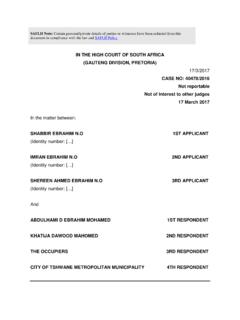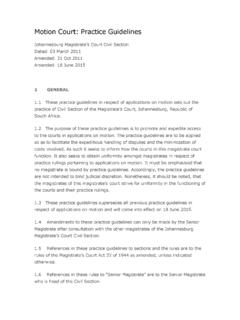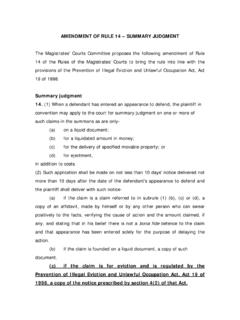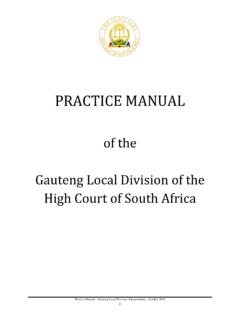Transcription of IN THE HIGH COURT OF SOUTH AFRICA GAUTENG LOCAL …
1 P a g e | 1 SAFLII Note: Certain personal/private details of parties or witnesses have been redacted from this document in compliance with the law and SAFLII Policy IN THE HIGH COURT OF SOUTH AFRICA GAUTENG LOCAL DIVISION, JOHANNESBURG Case number: 21145/17 In the matter between: GERHARD VAN DER WESTHUIZEN Applicant and PINKY NXIWENI First Respondent ALL THE UNLAWFULL OCCUPIERS OF SECTIONAL TITLE UNIT [..], WITH SCHEME NAME [..] BETTER KOWN AS [..] A. NEW REDRUTH, ALBERTON Second Respondent CITY OF EKURHULENI METROPOLITAN (1) REPORTABLE: NO (2) OF INTEREST TO OTHERS JUDGES:NO (3) REVISED 8 May 2017 DATE SIGNATURE P a g e | 2 MUNICIPALITY Third Respondent JUDGMENT Molahlehi, J Introduction [1] This an application in terms of which the applicant seeks an order evicting the respondent, Ms Nxiweni and those occupying the property with her at [.]
2 ] A. New Redruth, Alberton, Johannesburg (the property). The respondents are allegedly occupying the property without the consent of the applicant. Background facts [2] It is common cause that initially the occupation of the property by the first respondent was with the prior consent of the applicant in that the parties concluded a lease agreement which commenced on 1 October 2015. [3] In terms of the lease agreement the first respondent had to pay the sum of R6 deposit and after that pay the sum of R6 per month as the advanced rental. Clause 11 of the lease agreement made the first respondent liable for municipal charges of the property. [4] Failure to make payment of any amount required in terms of the lease agreement would result in a breach of the agreement. In that event the first respondent would be given twenty days by the applicant to remedy such a violation, and after that, the applicant would be entitled to terminate the agreement.
3 [5] The lease agreement further provided that upon cancellation of the lease as a result of the breach, the first respondent and any other person occupying the premises through her would be required to immediately vacate the premises and allow the applicant to take unhindered occupation as provided for in clause P a g e | 3 of the lease agreement. [6] The applicant states in his founding affidavit that the first respondent had breached the lease agreement by not paying the required rent, utility charges and deposit which is outstanding in the sum of R131 [7] On 8 January 2016, the first respondent through her erstwhile attorney was placed on terms to remedy the breach by paying the outstanding rental in the amount of R7 The respondent having allegedly failed to remedy the breach was then issued with the letter of termination of the lease agreement on 19 January 2016.
4 The respondent has refused to vacate the property despite the cancellation of the lease agreement and the demand that she leaves the property. [8] The application is opposed by the first respondent who represented herself during the hearing before me. She has raised several points in her defence against the application to evict her from the property she raised the following points. Non-joinder [9] The respondent contends that the applicant ought to have joined in these proceedings the Estate Agent because she assisted in the signing of the lease agreement. [10] The test for non- joinder is set out by the Supreme COURT of Appeal in Absa Bank Ltd v Naude NO,1 in the following terms: [10] The test whether there has been non-joinder is whether a party has a direct 1 (20264/2014) [2015] ZASCA 97 (1 June 2015).
5 P a g e | 4 and substantial interest in the subject matter of the litigation which may prejudice the party that has not been joined. In Gordon v Department of Health, Kwazulu-Natal it was held that if an order or judgment cannot be sustained without necessarily prejudicing the interest of third parties that had not been joined, then those third parties have a legal interest in the matter and must be joined. (Footnotes omitted). [11] In Judicial Service Commission and Another v Cape Bar Council and another2, the COURT held that: [12] It has by now become settled law that the joinder of a party is only required as a matter of necessity as opposed to a matter of convenience if that party has a direct and substantial interest which may be affected prejudicially by the judgment of the COURT in the proceedings concerned (see eg Bowring NO v Vrededorp Properties CC 2007 (5) SA 391 (SCA) para 21).
6 The mere fact that a party may have an interest in the outcome of the litigation does not warrant a non-joinder plea. The right of a party to validly raise the objection that other parties should have been joined to the proceedings, has thus been held to be a limited one. [12] Applying the above test, in the present matter, I am of the view that the point raised by the respondent bears no merit. There are no facts supporting the contention that it was necessary to join the Estate Agent as the party in these proceedings. Except for the fact that it (the estate agent) assisted in the signing of the lease agreement, there is nothing to show that it has direct and substantial interest in the matter. 2 2013 (1) SA 170 (SCA) at par [12] P a g e | 5 Non-compliance with PIE [13] The respondent contended that the applicant was not entitled to the relief sought because he did not comply with the provisions of the prevention of illegal and Unlawful Occupation of Land Eviction Act (PIE)3, as concerning the following: The first point in this respect is that the notice in terms of section 4(2) of the PIE Act does not state that the applicant has a title and that he is the owner of the property in question.
7 This point is, in my view, unsustainable because the applicant has attached to his papers the Windeed search which shows him as the owner of the property. [14] The respondent has also not disputed that the applicant is in control of the property as provided for in s 4 (1) of PIE Act. Ownership of the property [15] The respondent disputes ownership of the property by the applicant. The applicant has alleged in his founding affidavit that he is the owner of the property and in support thereof attached the Windeed report downloaded from the web site of the Deeds Office. In my view this is sufficient to prove ownership of the property by the However, even if that was not sufficient proof of ownership, the applicant still qualifies for the relief on the bases of the provisions of s 4. (1) of the PIE Act which provides: 4 (1) Notwithstanding anything to the contrary contained in any law or the common law, the provisions of this section apply to proceedings by an owner or 3 Act 19 of 1998 4 Sibango and Sixteen Others v PPM Plumbing (Pty) and Another.
8 Apr 20, 2016. P a g e | 6 person in charge of the land for the eviction of an unlawful occupier. [16] The second point is that the applicant has failed to provide a municipality report indicating that he intends evicting her with the recommendation by the municipality on whether it can provide alternative accommodation to her and child of school going. This point is dealt with later in the judgment under the general principles governing eviction. It suffices, however, to say that it does not bear any merit because of the failure by the respondent in her papers to deal with her circumstances that would justify intervention by the municipality. [17] The same applies to the third point which is that the applicant has failed to indicate whether the property in question is a primary residence of the applicant and whether the household is headed by a woman, disabled person and whether the rights of children or elderly people will be affected by the eviction and whether the municipality or any other organ of state has provided alternative accommodation to relocate the applicant.
9 [18] The first respondent has also submitted that she is a mother of school going children who attend school in the vicinity of the property which is also a primary residence. According to her, this is a factor which the applicant ought to have taken into account before seeking her eviction. [19] The first respondent further contends that the applicant has failed to honour its obligation in as far as the provisions of the lease agreement are concerned. In this regard, she states that upon entering the property after the conclusion of the lease agreement she found the property not repainted and in a near dilapidated state. She addressed a letter to the applicant s estate agent about the matter and was promised that it would be attended to, but nothing was done in that regard. P a g e | 7 She had to repair the geyser and the broken taps at her own cost.
10 She sent the bill of the costs related to the repairs to the estate agent who failed to settle it. [20] It seems from the above that the respondent is insisting on staying on the property despite the cancellation of the lease on the ground that she had repaired the damaged facilities and made some improvements to it. [21] Clause of the lease agreement expressly states that the tenant is not allowed to make any improvement on the property without the consent of the landlord. There is no evidence that the respondent complied with this requirement in making the alleged repairs and improvements. It follows therefore that this complaint cannot be a sustainable defence. [22] She also complains that the applicant cancelled the lease agreement on the basis of a 30 days notice, rather than two months notice as provided for in clause of the lease agreement.
















